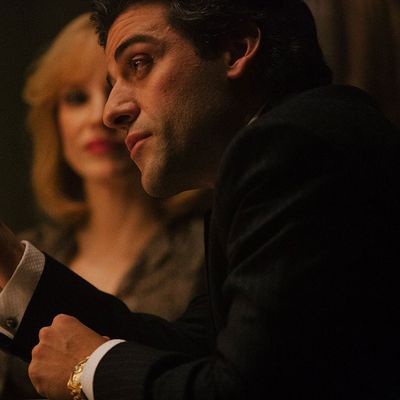
As Abel Morales, the strenuously upright capitalist of J.C. ChandorÔÇÖs A Most Violent Year, Oscar Isaac demonstrates the notion that the truly focused man does not use contractions. ÔÇ£I have always taken the path that is most right, and that is what this is,ÔÇØ he says late in the film, and his diction seems every bit as weighty as his ethos. Although events severely test him, Abel is determined not to break, neither his code nor his pronouns and verbs. Deliberateness is all. The movie itself is much like him. It holds you with its gravity and forces your respect. ItÔÇÖs also talky, repetitive, thesis-driven, and often strangled by its own solemnity. As a director, Chandor doesnÔÇÖt use contractions either.
The opening lays out the stakes with a vengeance. ItÔÇÖs 1981, a peak year in a peak era of New York crime, but Abel is bent on not bending. A child of immigrants, he has, by dint of rigorousness and hard work, prospered as an oil distributor and stands poised to go to the next level. He puts all his cash down on Queens waterfront property with tanks for storing vast quantities and has 30 days to deliver the balance of a million and a half dollars. His wife, Anna (Jessica Chastain), and partner, Andrew (Albert Brooks), look at him significantly and ask variations of, ÔÇ£Are you sure you want to do this?ÔÇØ The ultra-Orthodox Jew (Jerry Adler) from whom heÔÇÖs buying the property looks at him significantly and asks a variation of, ÔÇ£Are you sure you want to do this?ÔÇØ
There should, in the short term, be no problem: His bank is ready with a loan. But heÔÇÖs being assaulted on two fronts. A DA (David Oyelowo) tasked with cleaning up the industry is preparing to indict him on unspecified charges of corruption ÔÇö charges that, frankly, mystify him. The second problem is equally dire. AbelÔÇÖs trucks are being brutally hijacked on New York streets and later found abandoned, minus thousands of dollars worth of oil. HeÔÇÖs leaking on all fronts. AnnaÔÇÖs father and brother are mobstersÔÇöshe offers to call them in. But thatÔÇÖs not and never will be how Abel works. He doesnÔÇÖt even wantÔÇöat the behest of a Teamsters repÔÇöto let his drivers carry guns. His way is the high way.
Isaac is in nearly every scene and speaks like Michael Corleone at his most hyper-controlled and with a Frankie Avalon bouffant. YouÔÇÖd hardly recognize him from the CoensÔÇÖ Inside Llewyn DavisÔÇöor any other movie. He transforms. His Abel isnÔÇÖt a saint. As a businessman, he understands that good salesmanship involves techniques of manipulation, and though he treats his employees fairly, he expects them to perform at his level or theyÔÇÖre out. HeÔÇÖs not in the business of charity. What he seems to lack is the killer instinct that for Chandor (his first feature was the apocalyptic Wall Street drama Margin Call) defines modern capitalism. This is a source of tension between Abel and Anna. She left la familia to marry an upright man, but the gangsterÔÇÖs daughter increasingly surfaces. SheÔÇÖs faintly disgusted by his inaction. She wants him to be a man.
Whenever Chastain is onscreen, A Most Violent Year comes to life. SheÔÇÖs a hungry actress, and she tends to fix her eyes on her male co-stars as if she wants to seize and devour them. Under heavy lipstick and false eyelashes, her Anna radiates shrewdness and cynicism about How Things Work. But IsaacÔÇÖs Abel is largely impervious, insulated ÔÇö a little dull.
Cinematographer Bradford YoungÔÇÖs dark palette recalls the Godfather movies ÔÇö though it sometimes dims into soupiness ÔÇö and nothing goes against the dreary fabric. In one scene, the police arrive with a warrant to search the MoralesÔÇÖs big new suburban house in the middle of their daughterÔÇÖs birthday party, and Anna cuts the occasion short. But the mothers and their kids leave quietly, in orderly fashion. No kids dawdle or scream. Everyone is composed. It feels more like a funeral than a kidÔÇÖs birthday party. A Most Violent Year is like a James Gray urban psychodrama without the addition of a simmering, inchoate presence like Joaquin Phoenix to kick it out of its complacent style. ThereÔÇÖs a wild card in a Spanish driver (Elyes Gabel) who has been injured in a hijacking, but his panic never connects with the audience ÔÇö he seems out of scale with the rest of the film. And the movieÔÇÖs coda is sloppy and abrupt.
Albert Brooks gives a modest, likable performance that lightens the mood. The character isnÔÇÖt quite as nice as he seems, but heÔÇÖs humanly scaledÔÇöheÔÇÖs one of the few who hasnÔÇÖt wandered in from a Godfather movie. And I like ÔÇö as always ÔÇö what Chandor attempts: not just to denounce capitalism but to explain in detail how people go wrong. But the overcomposed, sedate A Most Violent Year lacks the one thing it most needs: violence.


